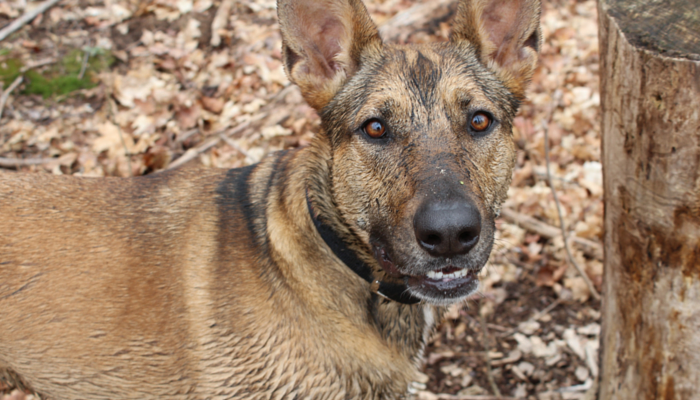A Grey Muzzle Doesn’t Always Indicate an Older Dog
Because of all the variables associated with coat colors a dog’s grey muzzle isn’t always an accurate way to estimate age. Dogs as young as 2 can have a lot of grey around their muzzle and eyebrows, though it’s often associated with dogs in middle to old age.
The condition of a dog’s teeth can usually give a more accurate indicator of a dog’s age, though it’s not an exact science because of outside influences. Estimates are made by the amount of tartar buildup and how worn down the incisors are. A dog’s lower incisors tend to remain uneven until a dog reaches middle age.

Why Do Dogs Go Grey Early?
Is your dog doing grey around the muzzle? Just as it is with humans there’s a couple different reasons as to why some dogs go grey early while others don’t grey much at all.
Two major factors come into play when it comes to dogs going grey — stress and genetics. Dogs with high levels of psychological stress or anxiety have been found to grey earlier, and the cellular stress that causes grey hairs has a genetic component in dogs.
On average most dogs start going grey around 5 years old, though some start going grey before the age of 2. Greying in dogs can occur anywhere, but it tends to be most prominent on their muzzle.
Geriatric vs Progressive Greying in Dogs
The premature greying I’m talking about with Laika is sometimes called geriatric greying, and it usually starts around the muzzle. It’s the greying that’s associated with the aging process, the same one that happens to humans.
There’s another type of greying that certain breeds go through called progressive greying. It’s caused by a progressive greying gene that causes their coats to turn grey or silver. This type of progressive greying is attributed to chromosome 25, though the gene itself has not been found.
Some breeds, such as Poodles and Bearded Collies, have the greying gene that causes their entire coat to turn silver. Because the progressive greying gene is dominant it’s also seen in some mixed breeds, especially in the UK where Bearded Collie & terrier crosses are common.